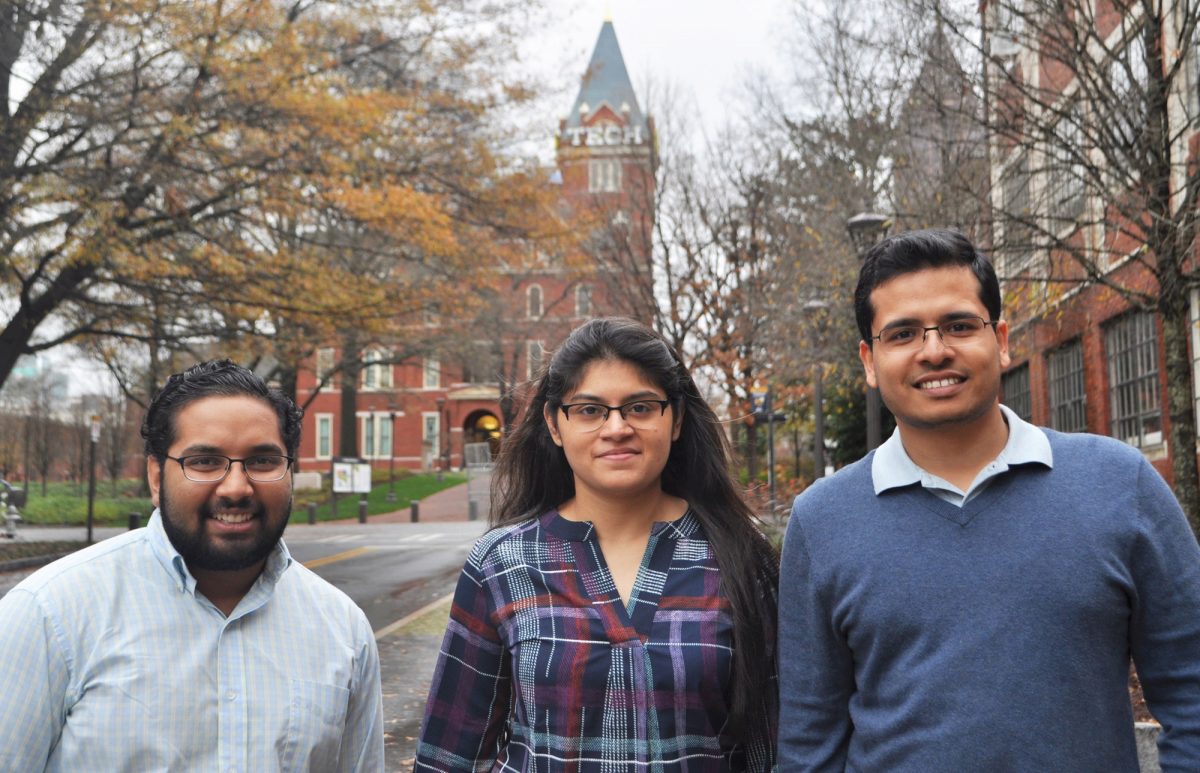 Finalist Hopefuls. Team Optibag (l to r): Sreenath Raparti (ISYE), Aarohi Shah (AE) and Mohit Gupta (AE) will find out if they’re finalists in the 2019 Fly Your Ideas competition later this spring. Gupta already knows a little about winning: in 2015, he was part of Team Multifun, which took home the top prize in the Airbus competition.
Finalist Hopefuls. Team Optibag (l to r): Sreenath Raparti (ISYE), Aarohi Shah (AE) and Mohit Gupta (AE) will find out if they’re finalists in the 2019 Fly Your Ideas competition later this spring. Gupta already knows a little about winning: in 2015, he was part of Team Multifun, which took home the top prize in the Airbus competition.
A team of Georgia Tech engineering students is hoping that their novel approach to airplane cargo handling will win them top honors in the 2019 Airbus Fly Your Ideas competition.
Aerospace engineering grad students Mohit Gupta and Aarohi Shah have been working with ISYE undergrad Sreenath Raparti on the idea, optimized baggage placement, for more than seven months. Their proposal is one of just 51 approved by Airbus for consideration in the second round of the global competition, which officially closes March 11.
The Airbus Fly Your Ideas competition involves three progressively challenging rounds, concluding in June at the Airbus headquarters in Toulouse, France, where six finalist teams will present their ideas to a jury of industry experts for a chance to win the €30,000 (~$34,000 USD) first place prize.
One perk about Fly Your Ideas is simply that - the idea is yours.
“Unlike other competitions, Airbus lets us freely use our ideas to impact the aerospace industry and grow it ourselves.” said Shah, a fourth-year graduate student.
Optibag is an algorithm designed to optimize baggage handling in a way that will cut down on loading time, fuel consumption, pollution and, ultimately, the cost for airlines.
To attack this challenge the teams were given a choice of six different approaches – from artificial intelligence to mixed reality. The Optibag team chose the data services approach, and, thus had to design an application that would improve production, workers’ lives, or customer experience.
Optibag does all three.
The problem, they explained, is one of stabilization. If the plane’s center of gravity (CG) is too far forward or too far back, pilots have one of two options for stabilizing the aircraft: add dead weight before takeoff and/or make changes to controls during flight. These two methods are referred to as “trimming the plane” and can be costly for airlines and cause a disturbance for customers who may have to change seats.
The team developed an algorithm that automatically incorporates key factors – loading time, baggage size, weight, dimensions, flight time – to determine the optimal placement within the aircraft. This removes the decision-making from individual handlers - a real time and cost saver.
The team had some help along the way. Airbus research and technology coordinator, Bruno Samaniego Lopez served as a mentor, helping students with technical inputs and addressing real-life problems that Airbus faces.
They also had an on-campus advisor from Georgia Tech’s Scheller College of Business professor Karthik Ramachandran. He advised the team throughout the process and even helped them patent their idea last June.
“The team is not only technically strong, but also has a great work ethic combined with inquisitiveness. I really enjoyed working with this skilled and motivated group of students,” said Ramachandran.